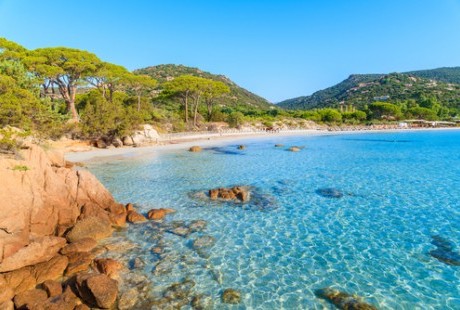Corsica: Birthplace of Napoleon
03/23/2017
Linguistically Corsica is like a patchwork; with Tuscan, Sardinian and Ligurian dialects.Only about 10% speak Corsican fluently as there has been considerable emigration from the Island, and immigration from the French mainland.
INTRODUCTION
Known as a Mediterranean region of France and the birthplace of Napoleon, Corsica might be thought of as a sort of French Sicily. Its people were traditionally clannish and suspicious of outsiders.
French control of Corsica is comparatively recent and there have been periods of independence and rule by others, hence the many fortresses. The island has a unique landscape that looks little like mainland France.The mainstays of the local economy were fishing and agriculture.As befits its wild reputation, most of the center of the Island is mountainous.Consequently, just 320,000 people inhabit its 3,300 square miles.
Located West of Italy, North of Sardinia and South-east of France, Corsica feels culturally different as a result. It is the fourth largest island in the Mediterranean after Sicily, Sardinia, and Cyprus. Bastia and Ajaccio are the two biggest towns in the North East and Central West respectively.
NATURE
The unspoiled nature of Corsica makes it particularly attractive to tourists especially Calvi in the North-West and Bonifacio and Porto-Vecchio in the South.
Corsica Natural Park (which covers most of the island) preserves rare species native to the island including Corsican Red Deer.Some parts of the park can only be accessed on foot or by boat, as it is mostly mountainous.As befits its topography, the climate varies from warm Mediterranean to mountain.
Take in some breathtaking lakes (such as Lac de Creno) and forests. In the heart of the national park is the fortress of Corte, sitting imposingly on top of a mountain with superb vistas.The spectacular Gorges de la Restonica are nearby too.
Hiking and walking can lead you to explore remote bucolic hamlets and take you through verdant, dense forests.The climate is so diverse that pretty quickly you can be at the beach, in a bay with a sparkling azure sea, or eating a delicious lunch with locally sourced food and drink. Why not hire a boat, or join a cruise tour around the Islands remoter coastline ?.Alternatively, lose yourself for a few hours freshwater or saltwater fishing.
PLACES OF NOTE
Bastia. This is a working port, but also has a quaint harbor and a cobbled old town and citadel area, whose streets are patchworked by ancient aqueducts that brought fresh water to the town.
Saint Florent. Has some great beaches and a lovely harbor while the hill village of Nonza and the picturesque bay of Centuri are further to the West.Nonza is located on a clifftop, dominated by an abandoned Genoese tower.Centuri has some especially nice eateries where you may hear some traditional Corsican music.
Heading South, you find yourself in another hilltop location in charming Bonifacio.Nearby is Ajaccio, famed as the birthplace of Napoleon, but possessing a beautiful Cathedral and Citadel. The bonus of Ajaccio is that is surrounded by lush green woodland but faces a welcoming deep blue sea.The town has an unusually mild climate. Obviously, one must visit the National Museum Napoleon Bonaparte, but the town is bursting with statues and images of its most famous son, the most attractive is in the Jardin de Casone. The old town is where most places of interest are located; narrow cobbled streets host brightly painted houses, don't forget to bring the camera it is beautiful.
The 16th-century Baroque Cathedral (full name Cathedrale Notre Dame de la Assomption) has the most historical attraction because Napoleon was baptized here and you can still see the baptismal font.
There are plenty of shopping opportunities here, as well as cafes, bars, and restaurants. Alternatively, sit in the Place Foch under the shade of one of the many trees and watch the world go by.
On a balmy summers evening join all the fashionable people by promenading, at a leisurely pace, along the harbor.Stop off at a bar and drink some thirst quenching beer or a chilled Corsican white wine.What could be better ?.
LANGUAGES OF CORSICA
Italian was the dominant language until the French conquest.Most Corsican languages are related in some way to it.However, there are exceptions; Cargese is a village inhabited by Greek immigrants (from the 17th century), and there are some Orthodox churches here which may seem odd on Corsica.
Linguistically Corsica is like a patchwork; with Tuscan, Sardinian and Ligurian dialects.Only about 10% speak Corsican fluently as there has been considerable emigration from the Island, and immigration from the French mainland.
CORSICAN FOOD AND DRINK
As with all rural societies, the cuisine reflects the land, so wild boar, and pork feature prominently. Fish and other seafood are regular staples, including freshwater fish such as Trout.Cheese including goat and sheep cheese and chestnuts will also be seen on a Corsican menu.There are locally produced wines and a potent aquavita (brandy). Corsican meat and game dishes are given a unique flavor because of the amount of nuts consumed by the animals in the forests.
GETTING AROUND IN CORSICA
The best way, and arguably the most fun way, of getting about on Corsica is via the 155 miles of narrow gauge railway mainly linking Ajaccio and Bastia.It is both quaint and practical.
Corsica is linked by ferry to Sardinia, Marseilles, Toulon and Nice in France and Genoa, Savona, Piombino, and Livorno in Italy.Bastia is the primary destination followed by Ajaccio.
FLIGHTS TO CORSICA
Corsica has four international airports:
Ajaccio Napoleon Bonaparte Airport
Bastia – Poretta Airport
Calvi – Sainte-Catherine Airport
Figari–Sud Corse Airport (near Bonifacio and Porto-Vecchio in the south)
Bastia – Poretta Airport
Calvi – Sainte-Catherine Airport
Figari–Sud Corse Airport (near Bonifacio and Porto-Vecchio in the south)
Air Corsica and Air France fly into regional airports in France (mainly Paris Orly), while budget carriers Ryan Air and Easyjet operate summer services.
SUMMARY
For those who like the countryside and unsullied beauty, Corsica must be a destination.






